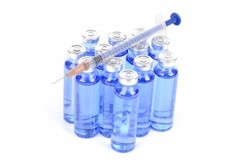FDA raids pharmacy linked to meningitis outbreak
Phil Taylor, 17-Oct-2012
 The US Food and Drug Administration (FDA) has raided a compounding pharmacy at the heart of a fatal meningitis outbreak in the US.
The US Food and Drug Administration (FDA) has raided a compounding pharmacy at the heart of a fatal meningitis outbreak in the US.
Agents from the FDA's Office of Criminal Investigations - backed up by local police - turned up yesterday evening at the New England Compounding Centre (NECC) in Framingham, Massachusetts, as part of an investigation into contaminated steroid injections that have left 19 people dead and around 245 seriously ill.
So far the deaths have been linked to fungal contamination of supposedly sterile vials of methylprednisolone acetate used as an epidural treatment for back pain, although some cases of meningitis have been seen in patients receiving other NECC products, including another injectable steroid called triamcinolone acetonide and a cardioplegic solution used during heart surgery.
NECC has already announced a recall of all its products, ceased manufacturing operations and surrendered its license to the Massachusetts Board of Registration in Pharmacy, and a spokesman for the company questioned the necessity of a raid given that it is cooperating fully with the authorities.
Federal agents searched the company's offices and seized documents in the raid on the compounding pharmacy, which creates pharmaceutical preparations on demand for individual patients, often providing hard-to-source medicines.
There is no doubt that compounders provide a valuable service, but the case has raised questions about the quality control systems they employ - which are not considered to be as stringent as those required for pharmaceutical production plants - and also how medicines are tracked through the supply chain.
The incident also increases the case for a national track-and-trace system which could be used to identify and treat patients exposed to potentially hazardous medicines more quickly. FDA investigators are still trying to track down the tens of thousands of NECC product that remains unaccounted for.
Meanwhile, the agency has advised healthcare professionals to follow-up with patients who were administered any injectable medication from or produced by NECC, including injectable ophthalmic drugs used in conjunction with eye surgery, or a cardioplegic solution purchased from or produced by NECC after May 21, 2012.
A full list of the recalled medicines is available here.
The NECC case has refocused attention on a longstanding debate about the safety of the US compounding pharmacy industry, which has been rumbling on for more than a decade and punctuated by a string of safety incidents in recent years.
Earlier this year nine cases of a fungal eye infection were reported in California that were subsequently linked to a product made at Franck's Compounding Lab in Florida, while in 2011 improper filtration procedures at a compounder was linked to an outbreak of bacterial blood infections.
A cluster of fungal blood infections associated with a contaminated opioid analgesic product (fentanyl) was reported in Maryland in 2007, while in 2005 the Centers for Disease Control and Prevention was notified of four cases of blood infections with a bacteria called Pseudomonas fluorescens that were eventually traced to contaminated heparinized saline intravenous flush syringes. Once again the drugs were prepared by compounding pharmacies.
The FDA warned more than 10 years ago that it had concerns about quality standards at compounding pharmacies but attempts to bring in regulation were knocked back in Congress.
In a statement, the Houston-based International Academy of Compounding Pharmacists (IACP) said the latest outbreak had caused "great concern", but stressed that all compounding pharmacists and pharmacies are subject to adequate oversight by State Boards of Pharmacy, the FDA and the Drug Enforcement Administration (DEA).
It said the pharmacy profession has an accrediting organisation - the Pharmacy Compounding Accreditation Board (PCAB) – which "provides an additional level of quality assurance recognition for sterile and non-sterile compounded preparations", and pointed out that NECC is not currently accredited by this body.
There are an estimated 7,500 pharmacies in the US that specialise in advanced compounding services, and of these around 3,000 provide sterile compounding, according to the IACP.

©
SecuringIndustry.com




 The US Food and Drug Administration (FDA) has raided a compounding pharmacy at the heart of a fatal meningitis outbreak in the US.
The US Food and Drug Administration (FDA) has raided a compounding pharmacy at the heart of a fatal meningitis outbreak in the US.